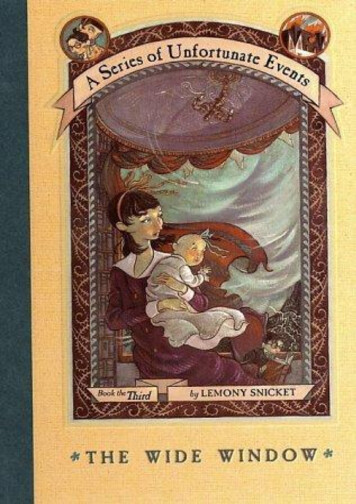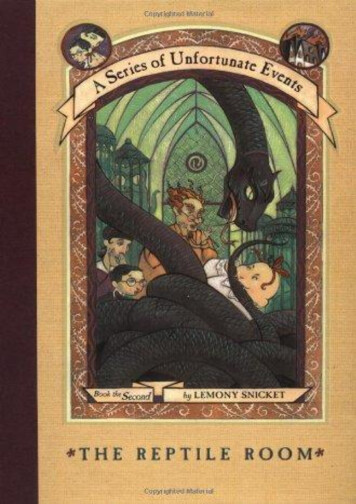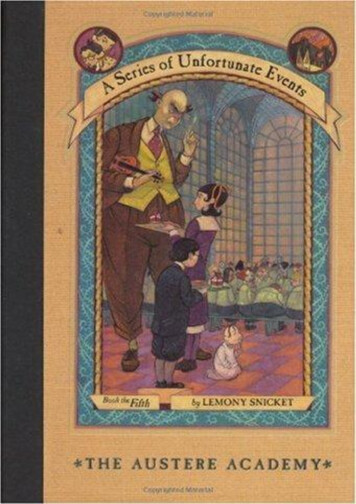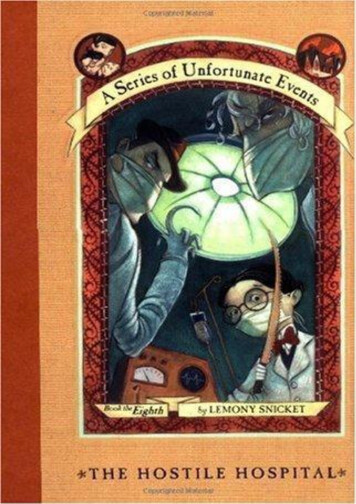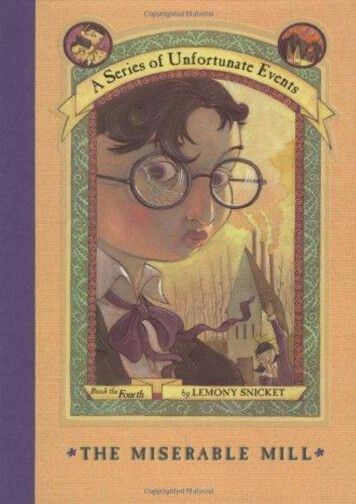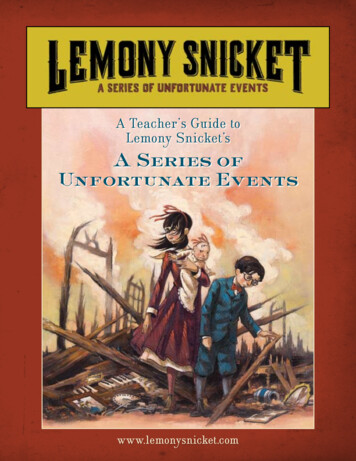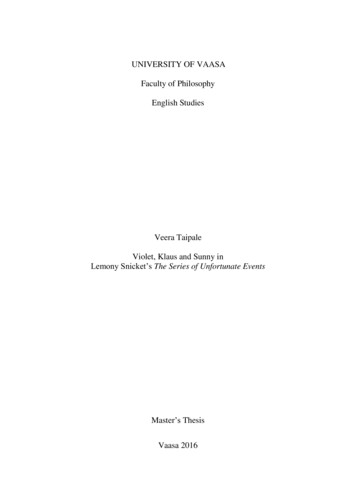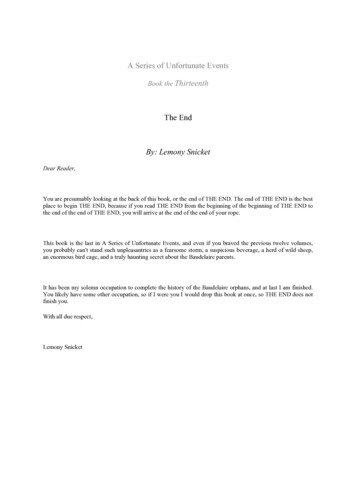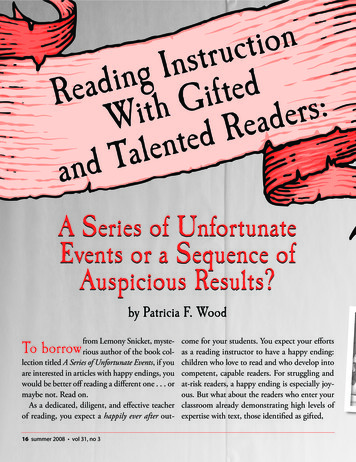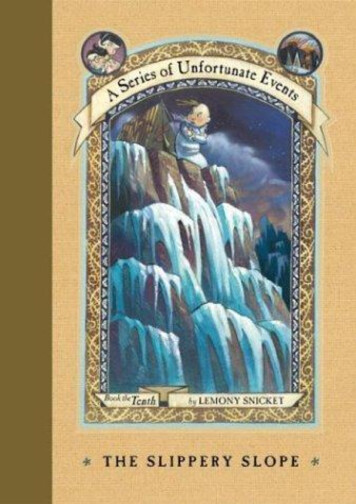
Transcription
A Series of Unfortunate Events 10 - TheSlippery SlopeASeriesofUnfortunateEventsA Series of Unfortunate EventsBook the TenthThe Slippery SlopeLemony SnicketCHAPTEROneA man of my acquaintance once wrote a poem called “The Road Less Traveled,”describing a journey he took through the woods along a path most travelers neverused. The poet found that the road less traveled was peaceful but quite lonely, and hewas probably a bit nervous as he went along, because if anything happened on theroad less traveled, the other travelers would be on the road more frequently traveledand so couldn’t hear him as he cried for help. Sure enough, that poet is now dead.Like a dead poet, this book can be said to be on the road less traveled, because itbegins with the three Baudelaire children on a path leading through the MortmainMountains , which is not a popular destination for travelers, and it ends in thechurning waters of the Stricken Stream, which few travelers even go near. But thisbook is also on the road less traveled, because unlike books most people prefer,which provide comforting and entertaining tales about charming people and talkinganimals, the tale you are reading now is nothing but distressing and unnerving, andthe people unfortunate enough to be in the story are far more desperate and franticthan charming, and I would prefer to not speak about the animals at all. For thatreason, I can no more suggest the reading of this woeful book than I can recommendwandering around the woods by yourself, because like the road less traveled, thisbook is likely to make you feel lonely, miserable, and in need of help. The Baudelaireorphans, however, had no choice but to be on the road less traveled. Violet and Klaus,the two elder Baudelaires, were in a caravan, traveling very quickly along the highmountain path. Neither Violet, who was fourteen, nor Klaus, who had recently turnedthirteen, had ever thought they would find themselves on this road, except perhapswith their parents on a family vacation. But the Baudelaire parents were nowhere tobe found after a terrible fire destroyed their home — although the children had reasonto believe that one parent may not have died in the blaze after all — and the caravanwas not heading up the Mortmain Mountains, toward a secret headquarters thesiblings had heard about and were hoping to find. The caravan was heading down theMortmain Mountains , very quickly, with no way to control or stop its journey, so
Violet and Klaus felt more like fish in a stormy sea than travelers on a vacation.But Sunny Baudelaire was in a situation that could be said to be even moredesperate. Sunny was the youngest Baudelaire, still learning to speak in a way thateveryone could understand, so she scarcely had words for how frightened she was.Sunny was traveling uphill, toward the headquarters in the Mortmain Mountains , inan automobile that was working perfectly, but the driver of the automobile was a manwho was reason enough for being terrified. Some people called this man wicked.Some called him facinorous, which is a fancy word for “wicked.” But everyonecalled him Count Olaf, unless he was wearing one of his ridiculous disguises andmaking people call him a false name. Count Olaf was an actor, but he had largelyabandoned his theatrical career to try to steal the enormous fortune the Baudelaireparents had left behind. Olaf’s schemes to get the fortune had been mean-spirited andparticularly complicated, but nevertheless he had managed to attract a girlfriend, avillainous and stylish woman named Esmé Squalor, who was sitting next to CountOlaf in the car, cackling nastily and clutching Sunny on her lap. Also in the car wereseveral employees of Olaf’s, including a man with hooks instead of hands, twowomen who liked to wear white powder all over their faces, and three new comradesOlaf had recently recruited at Caligari Carnival. The Baudelaire children had been atthe carnival, too, wearing disguises of their own, and had pretended to join CountOlaf in his treachery, but the villain had seen through their ruse, a phrase which heremeans “realized who they really were, and cut the knot attaching the caravan to thecar, leaving Sunny in Olaf’s clutches and her siblings tumbling toward their doom.”Sunny sat in the car and felt Esmé‘s long fingernails scratch her shoulders, andworried about what would happen to her and what was happening to her oldersiblings, as she heard their screams getting fainter and fainter as the car drove fartherand farther away.“We have to stop this caravan!” Klaus screamed. Hurriedly, he put on his glasses,as if by improving his vision he might improve the situation. But even in perfectfocus, he could see their predicament was dire. The caravan had served as a home forseveral performers at the carnival’s House of Freaks before they defected — a wordwhich here means “joined Count Olaf’s band of revolting comrades” — and now thecontents of this tiny home were rattling and crashing with each bump in the road.Klaus ducked to avoid a roasting pan, which Hugo the hunchback had used to preparemeals and which had toppled off a shelf in the commotion. He lifted his feet from thefloor as a set of dominoes skittered by — a set that Colette the contortionist had likedto play with. And he squinted above him as a hammock swung violently overhead.An ambidextrous person named Kevin used to sleep in that hammock until he hadjoined Olaf’s troupe, along with Hugo and Colette, and now it seemed like it mightfall at any moment and trap the Baudelaires beneath it.The only comforting thing that Klaus could see was his sister, who was lookingaround the caravan with a fierce and thoughtful expression and unbuttoning the shirtthe two siblings were sharing as part of their disguise. “Help me get us out of thesefreakish pants we’re both in,” Violet said. “There’s no use pretending we’re a twoheaded person anymore, and we both need to be as able-bodied as possible.”
In moments, the two Baudelaires wriggled out of the oversized clothing they hadtaken from Count Olaf’s disguise kit and were standing in regular clothes, trying tobalance in the shaky caravan. Klaus quickly stepped out of the path of a falling pottedplant, but he couldn’t help smiling as he looked at his sister. Violet was tying her hairup in a ribbon to keep it out of her eyes, a sure sign that she was thinking up aninvention. Violet’s impressive mechanical skills had saved the Baudelaires’ livesmore times than they could count, and Klaus was certain that his sister could concoctsomething that couldstop the caravan’s perilous journey.“Are you going to make a brake?” Klaus asked.“Not yet,” Violet said. “A brake interferes with the wheels of a vehicle, and thiscaravan’s wheels are spinning too quickly for interference. I’m going to unhook thesehammocks and use them as a drag chute.”“Drag chute?” Klaus said.“Drag chutes are a little like parachutes attached to the back of a car,” Violetexplained hurriedly, as a coatrack clattered around her. She reached up to thehammock where she and Klaus had slept and quickly detached it from the wall.“Race drivers use them to help stop their cars when a race is over. If I dangle thesehammocks out the caravan door, we should slow down considerably.”“What can I do?” Klaus said.“Look in Hugo’s pantry,” Violet said, “and see if you can find anything sticky.”When someone tells you to do something unusual without an explanation, it isvery difficult not to ask why, but Klaus had learned long ago to have faith in hissister’s ideas, and quickly crossed to a large cupboard Hugo had used to storeingredients for the meals he prepared. The door of the cupboard was swinging backand forth as if a ghost were fighting with it, but most of the items were still rattlingaround inside. Klaus looked at the cupboard and thought of his baby sister, who wasgetting farther and farther away from him. Even though Sunny was still quite young,she had recently shown an interest in cooking, and Klaus remembered how she hadmade up her own hot chocolate recipe, and helped prepare a delicious soup the entirecaravan had enjoyed. Klaus held the cupboard door open and peered inside, andhoped that his sister would survive to develop her culinary skills.“Klaus,” Violet said firmly, taking down another hammock and tying it to the firstone. “I don’t mean to rush you, but we need to stop this caravan as soon as possible.Have you found anything sticky?”Klaus blinked and returned to the task at hand. A ceramic pitcher rolled around hisfeet as he pushed through the bottles and jars of cooking materials. “There’s lots ofsticky things here,” he said. “I see blackstrap molasses, wild clover honey, cornsyrup, aged balsamic vinegar, apple butter, strawberry jam, caramel sauce, maplesyrup, butterscotch topping, maraschino liqueur, virgin and extra-virgin olive oil,lemon curd, dried apricots, mango chutney, crema di noci, tamarind paste, hotmustard, marshmallows, creamed corn, peanut butter, grape preserves, salt water
taffy, condensed milk, pumpkin pie filling, and glue. I don’t know why Hugo keptglue in the pantry, but never mind. Which items do you want?”“All of them,” Violet said firmly. “Find some way of mixing them, while I tiethese hammocks together.”Klaus grabbed the pitcher from the floor and began to pour the ingredients into it,while Violet, sitting on the floor to make it easier to balance, gathered the cords ofthe hammocks in her lap and began twisting them into a knot. The caravan’s journeygrew rougher and rougher, and with each jolt, the Baudelaires felt a bit seasick, as ifthey were back on Lake Lachrymose , crossing its stormy waters to try and rescueone of their many unfortunate guardians. But despite the tumult around them, inmoments Violet stood up with the hammocks gathered in her arms, all tied together ina mass of fabric, and Klaus looked at his sister and held up the pitcher, which wasfilled to the brim with a thick and colorful slime.“When I say the word,” Violet said, “I’m going to open the door and cast thesehammocks out. I want you at the other end of the caravan, Klaus. Open that littlewindow and pour that mixture all over the wheels. If the hammocks work as a dragchute and the sticky substance interferes with the wheels, the caravan should slowdown enough to save us. I just need to tie the hammocks to the doorknob.”“Are you using the Devil’s Tongue knot?” Klaus asked.“The Devil’s Tongue hasn’t brought us the best luck,” Violet said, referring toseveral previous rope-related escapades. “I’m using the Sumac, a knot I inventedmyself. I named it after a singer I admire. There — it feels secure. Are you ready topour that mixture onto the wheels?”Klaus crossed to the window and opened it. The wild clattering sound of thecaravan’s wheels grew louder, and the Baudelaires stared for a moment at thecountryside racing by. The land was jagged and twisty, and it seemed that the caravancould tumble at any moment into a hole, or off the edge of one of the mountain’ssquare peaks. “I guess I’m ready,” Klaus said hesitantly. “Violet, before we try yourinvention, I want to tell you something.”“If we don’t try it now,” Violet said grimly, “you won’t have the chance to tell meanything.” She gave her knot one more tug and then turned back to Klaus. “Now!”she said, and threw open the caravan door.It is often said that if you have a room with a view, you will feel peaceful andrelaxed, but if the room is a caravan hurtling down a steep and twisted road, and theview is an eerie mountain range racing backward away from you, while chillymountain winds sting your face and toss dust into your eyes, then you will not feelone bit of peace or relaxation. Instead you will feel the horror and panic that theBaudelaires felt when Violet opened the door. For a moment they could do nothingbut stand still, feeling the wild tilting of the caravan, and looking up at the odd,square peaks of the Mortmain Mountains, and hearing the grinding of the caravan’swheels as they rolled over rocks and tree stumps. But then Violet shouted “Now!”once more, and both siblings snapped into action. Klaus leaned out the window andbegan to pour the mixture of blackstrap molasses, wild clover honey, corn syrup,
aged balsamic vinegar, apple butter, strawberry jam, caramel sauce, maple syrup,butterscotch topping, maraschino liqueur, virgin and extra-virgin olive oil, lemoncurd, dried apricots, mango chutney, crema di noci, tamarind paste, hot mustard,marshmallows, creamed corn, peanut butter, grape preserves, salt water taffy,condensed milk, pumpkin pie filling, and glue onto the closest wheels, while hissister tossed the hammocks out of the door, and if you have read anything of theBaudelaire orphans’ lives — which I hope you have not — then you will not besurprised to read that Violet’s invention worked perfectly. The hammocksimmediately caught the rushing air and swelled out behind the caravan like enormouscloth balloons, which slowed the caravan down quite a bit, the way you would runmuch slower if you were dragging something behind you, like a knapsack or asheriff. The sticky mixture fell on the spinning wheels, which immediately began tomove with less ferocity, the way you would run with less ferocity if you suddenlyfound yourself running in quicksand or through lasagne. The caravan slowed down,and the wheels spun less wildly, and within moments the two Baudelaires weretraveling at a much more comfortable pace.“It’s working!” Klaus cried.“We’re not done yet,” Violet said, and walked over to a small table that hadoverturned in the confusion. When the Baudelaires were living at Caligari Carnival,the table had come in handy as a place to sit and make plans, but now in theMortmain Mountains , it would come in handy for a different reason. Violet draggedthe table over to the open door. “Now that the wheels are slowing down,” she said,“we can use this as a brake.” Klaus dumped the last of the mixture out of the pitcher,and turned to his sister. “How?” he said, but Violet was already showing him how.Quickly she lay on the floor, and holding the table by its legs, dangled it out of thecaravan so it dragged on the ground. Immediately there was a loud scraping sound,and the table began to shake roughly in Violet’s hands. But she held fast, forcing thetable to scrape against the rocky ground and slow the caravan down even more. Theswaying of the caravan became gentler and gentler, and the fallen items owned by thecarnival employees stopped crashing, and then with one last whine, the wheelsstopped altogether, and everything was still. Violet leaned out of the door and stuckthe table in front of one of the wheels so it couldn’t start rolling again, and then stoodup and looked at her brother.“We did it,” Violet said.“You did it,” Klaus said. “The entire plan was your idea.” He put down the pitcheronthe floor and wiped his hands on a fallen towel.“Don’t put down that pitcher,” Violet said, looking around the wreckage of thecaravan.“We should gather up as many useful things as possible. We’ll need to get thiscaravan moving uphill if we want to rescue Sunny.”“And reach the headquarters,” Klaus added. “Count Olaf has the map we found,but I remember that the headquarters are in the Valley of Four Drafts, near the source
of the Stricken Stream. It’ll be very cold there.”“Well, there is plenty of clothing,” Violet said, looking around. “Let’s grabeverything we can and organize it outside.”Klaus nodded in agreement, and picked up the pitcher again, along with severalitems of clothing that had fallen in a heap on top of a small hand mirror that belongedto Colette. Staggering from carrying so many things, he walked out of the caravanbehind his sister, who was carrying a large bread knife, three heavy coats, and aukulele that Hugo used to play sometimes on lazy afternoons. The floors of thecaravan creaked as the Baudelaires stepped outside, into the misty and emptylandscape, and realized how fortunate they had been.The caravan had stopped right at the edge of one of the odd, square peaks of themountain range. The Mortmain Mountains looked like a staircase, heading up intothe clouds or down into a veil of thick, gray mist, and if the caravan had kept going inthe same direction, the two Baudelaires would have toppled over the peak and fallendown through the mist to the next stair, far, far below. But to one side of the caravan,the children could see the waters of the Stricken Stream, which were an odd grayishblack color, and moved slowly and lazily downhill like a river of spilled oil. Had thecaravan swerved to one side, the children would have been dumped into the dark andfilthy waters.“It looks like the brake worked just in time,” Violet said quietly. “No matter wherethe caravan would have gone, we would have been finished.”Klaus nodded in agreement and looked around at the wilderness. “It will bedifficult to navigate the caravan out of here,” Klaus said. “You’ll have to invent asteering device.”“And some sort of engine,” Violet said. “That will take some time.”“We don’t have any time,” Klaus said. “If we don’t hurry, Count Olaf will be toofar away and we’ll never find Sunny.”“We’ll find her,” Violet said firmly, and put down the items she was carrying.“Let’s go back into the caravan, and look for — ”But before Violet could say what to look for, she was interrupted by an unpleasantcrackling noise. The caravan seemed to moan, and then slowly began to roll towardthe edge of the peak. The Baudelaires looked down and saw that the wheels hadsmashed the small table, so there was nothing to stop the caravan from moving again.Slowly and awkwardly it pitched forward, dragging the hammocks behind it as itneared the very edge of the peak. Klaus leaned down to grab hold of a hammock, butViolet stopped him. “It’s too heavy,” she said. “We can’t stop it.”“We can’t let it fall off the peak!” Klaus cried.“We’d be dragged down, too,” Violet said.Klaus knew his sister was right, but still he wanted to grab the drag chute Violethad constructed. It is difficult, when faced with a situation you cannot control, toadmit that you can do nothing, and it was difficult for the Baudelaires to stand and
watch the caravan roll over the edge of the peak. There was one last creak as the backwheels bumped against a mound of dirt, and then the caravan disappeared in absolutesilence. The Baudelaires stepped forward and peered over the edge of the peak, but itwas so misty that the caravan was only a ghostly rectangle, getting smaller andsmaller as it faded away.“Why isn’t there a crash?” Klaus asked.“The drag chute is slowing it down,” Violet said. “Just wait.”The siblings waited, and after a moment there was a muffled boom! from below asthe caravan met its fate. In the mist, the children could not see a thing, but they knewthat the caravan and everything inside it were gone forever, and indeed I have neverbeen able to find its remains, even after months of searching the area with only alantern and a rhyming dictionary for company. It seems that even after countlessnights of battling snow gnats and praying the batteries would not run out, it is my fatethat some of my questions will never be answered.Fate is like a strange, unpopular restaurant, filled with odd waiters who bring youthings you never asked for and don’t always like. When the Baudelaires were veryyoung, they would have guessed that their fate was to grow up in happiness andcontentment with their parents in the Baudelaire mansion, but now both the mansionand their parents were gone. When they were attending Prufrock Preparatory School ,they had thought that their fate was to graduate alongside their friends theQuagmires, but they hadn’t seen the academy or the two triplets in a very long time.And just moments ago, it had looked like Violet and Klaus’s fate had been to fall offa peak or into a stream, but now they were alive and well, but far away from theirsister and without a vehicle to help them find her again.Violet and Klaus moved closer to one another, and felt the icy winds of theMortmain Mountains blow down the road less traveled and give them goosebumps.They looked at the dark and swirling waters of the Stricken Stream, and they lookeddown from the edge of the peak into the mist, and then looked at one another andshivered, not only at the fates they had avoided, but at all the mysterious fates that layahead.Violet took one last look over the misty peak, and then reached down to put on oneof the heavy coats she had taken from the caravan. “Take one of these coats,” shesaid to her brother. “It’s cold out here, and it’s likely to get even colder. Theheadquarters are supposed to be very high up in the mountains. By the time we getthere, we’ll probably be wearing every stitch of this clothing.”“But how are we going to get there?” Klaus said. “We’re nowhere near the Valleyof Four Drafts, and the caravan is destroyed.”“Let’s take a moment to see what we have,” Violet said. “I might be able toconstruct something from the items we managed to take.”“I hope so,” Klaus said. “Sunny is getting farther and farther away. We’ll nevercatch up with her without some sort of vehicle.”Klaus spread out the items from the caravan, and put on one of the coats while
Violet picked through her pile, but instantly the two Baudelaires saw that a vehiclewas not in the realm of possibility, a phrase which here means “could not be madefrom a few small objects and some articles of clothing previously belonging tocarnival employees.” Violet tied her hair up in a ribbon again and frowned down onthe few items they had managed to save. In Klaus’s pile there was the pitcher, stillsticky from the substance he had used to slow down the caravan wheels, as well asColette’s hand mirror, a wool poncho, and a sweatshirt that read CALlGARlCARNIVAL. In Violet’s pile was the large bread knife, the ukulele, and one morecoat. Even Klaus, who was not as mechanically minded as his sister, knew that thematerials gathered on the ground were not enough to make something that could takethe two children through the Mortmain Mountains .“I suppose I could make a spark by rubbing two rocks together,” Violet said,looking around the misty countryside for additional inventing materials, “or we couldplay the ukulele and bang on the pitcher. A loud noise might attract some help.”“But who would hear it?” Klaus said, gazing at the gloomy mist. “We didn’t see asign of anyone else when we were in the caravan. The way through the MortmainMountains is like a poem I read once, about the road less traveled.”“Did the poem have a happy ending?” Violet asked.“It was neither happy nor unhappy,” Klaus said. “It was ambiguous. Well, let’sgather up these materials and take them with us.”“Take them with us?” Violet said. “We don’t know where to go, and we don’tknow how to get there.”“Sure we do,” Klaus said. “The Stricken Stream starts at a source high in themountains, and winds its way down through the Valley of Four Drafts, where theheadquarters are. It’s probably not the quickest or easiest way to get there, but if wefollow the stream up the mountains, it’ll take us where we want to go.”“But that could take days,” Violet said. “We don’t have a map, or any food orwater for the journey, or tents or sleeping bags or any other camping equipment.”“We can use all this clothing as blankets,” Klaus said, “and we can sleep in anyshelter we find. There were quite a few caves on the map that animals use forhibernation.”The two Baudelaires looked at one another and shivered in the chilly breeze. Theidea of hiking for hours in the mountains, only to sleep wrapped in someone else’sclothing in a cave that might contain hibernating animals, was not a pleasant one, andthe siblings wished they did not have to take the road less traveled, but instead couldtravel in a swift, well-heated vehicle and reach their sister in mere moments. Butwishing, like sipping a glass of punch, or pulling aside a bearskin rug in order toaccess a hidden trapdoor in the floor, is merely a quiet way to spend one’s timebefore the candles are extinguished on one’s birthday cake, and the Baudelaires knewthat it would be best to stop wishing and start their journey. Klaus put the hand mirrorand the ukulele in his coat pockets and picked up the poncho and the pitcher, whileViolet put the bread knife in her pocket and picked up the sweatshirt and the last coat,
and then, with one last look at the tracks the caravan left behind as it toppled over thepeak, the two children began to follow the Stricken Stream.If you have ever traveled a long distance with a family member, then you knowthat there are times when you feel like talking and times when you feel like beingquiet. This was one of the quiet times. Violet and Klaus walked up the slopes of themountain toward the headquarters they hoped to reach, and they heard the sound ofthe mountain winds, a low, tuneless moan like someone blowing across the top of anempty bottle, and the odd, rough sound of the stream’s fish as they stuck their headsout of the dark, thick waters of the stream, but both travelers were in a quiet moodand did not say a word to one another, each lost in their own thoughts.Violet let her mind wander to the time she had spent with her siblings in theVillage of Fowl Devotees, when a mysterious man named Jacques Snicket wasmurdered, and the children were blamed for the crime. They had managed to escapefrom prison and rescue their friends Duncan and Isadora Quagmire from CountOlaf’s clutches, but then had been separated at the last moment from the two triplets,who sailed away in a self sustaining hot air mobile home built by a man namedHector. None of the Baudelaires had seen Hector or the two Quagmires since, andViolet wondered if they were safe and if they had managed to contact a secretorganization they’d discovered. The organization was called V.F.D., and theBaudelaires had not yet learned exactly what the organization did, or even what allthe letters stood for. The children thought that the headquarters at the Valley of FourDrafts might prove to be helpful, but now, as the eldest Baudelaire trudged alongsidethe Stricken Stream, she wondered if she would ever find the answers she waslooking for.Klaus was also thinking about the Quagmires, although he was thinking aboutwhen the Baudelaires first met them, at Prufrock Preparatory School . Many of thestudents at the school had been quite mean to the three siblings — particularly a verynasty girl named Carmelita Spats — but Isadora and Duncan had been very kind, andsoon the Baudelaires and the Quagmires had become inseparable, a word which heremeans “close friends.” One reason for their friendship had been that both sets ofchildren had lost people who were close to them. The Baudelaires had lost theirparents, of course, and the Quagmires had lost not only their parents but their brother,the third Quagmire triplet, whose name was Quigley. Klaus thought about theQuagmires’ tragedy, and felt a little guilty that one of his own parents might be aliveafter all. A document the Baudelaires had found contained a picture of their parentsstanding with Jacques Snicket and another man, with a caption reading “Because ofthe evidence discussed on page nine, experts now suspect that there may in fact beone survivor of the fire, but the survivor’s whereabouts are unknown.” Klaus had thisdocument in his pocket right now, along with a few scraps of the Quagmires’notebooks that they had managed to give him. Klaus walked beside his older sister,thinking of the puzzle of V.F.D. and how kindly the Quagmires had tried to help themsolve the mystery that surrounded them all. He was thinking so hard about thesethings that when Violet finally broke the silence, it was as if he were waking up froma long, confusing dream.
“Klaus,” she said, “when we were in the caravan, you said you wanted to tell mesomething before we tried the invention, but I didn’t let you. What was it?”“I don’t know,” Klaus admitted. “I just wanted to say something, in case — well,in case the invention didn’t work.” He sighed, and looked up at the darkening sky. “Idon’t remember the last thing I said to Sunny,” he said quietly. “It must have beenwhen we were in Madame Lulu’s tent, or maybe outside, just before we stepped intothe caravan. Had I known that Count Olaf was going to take her away, I would havetried to say something special. I could have complimented her on the hot chocolateshe made, or told her how skillful she was at staying in disguise.”“You can tell her those things,” Violet said, “when we see her again.”“I hope so,” Klaus said glumly, “but we’re so far behind Olaf and his troupe.”“But we know where they’re going,” Violet said, “and we know that he won’tharm a hair on her head. Count Olaf thinks we perished in the caravan, so he needsSunny to get his hands on the fortune.”“She’s probably unharmed,” Klaus agreed, “but I’m sure she’s very frightened. Ijust hope she knows we’re coming after her.”“Me, too,” Violet said, and walked in a silence for a while, interrupted only by thewind and the odd, gurgling noise of the fish.“I think those fish are having trouble breathing,” Klaus said, pointing into thestream. “Something in the water is making them cough.”“Maybe the Stricken Stream isn’t always that ugly color,” Violet said. “Whatwould turn normal water into grayish black slime?”“Iron ore,” Klaus said thoughtfully, trying to remember a book on high-altitudeenvironmentalism he had read when he was ten. “Or perhaps a clay deposit, loosenedby an earthquake or another geological event, or some sort of pollution. There mightbe an ink or licorice factory nearby.”“Maybe V.F.D. will tell us,” Violet said, “when we reach the headquarters.”“Maybe one of our parents will tell us,” Klaus said quietly.“We shouldn’t get our hopes up,” Violet said. “Even if one of our parents reallydid survive the fire, and the V.F.D. headquarters really
A Series of Unfortunate Events 10 - The Slippery Slope ASeriesofUnfortunateEvents A Series of Unfortunate Events Book the Tenth The Slippery Slope Lemony Snicket C H A P T E R One A man of my acquaintance once wrote a poem called "The Road Less Traveled," describing a journey he took through the woods along a path most travelers never used.
